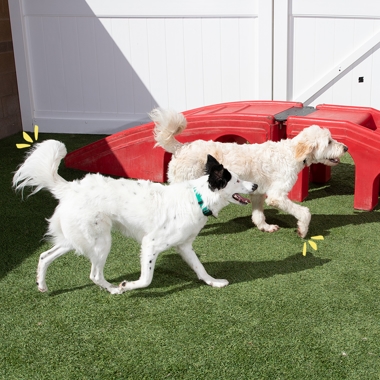Showing your dog love is an important part of being a pup parent, it comes to us so easy! Along with regularly giving your dog adoration, it is important to incorporate a few additional key habits to keep your fur baby happy and healthy.
Physical and Mental Exercise
Keeping your dog in tiptop shape is critical for their long-term health. Reaching their exercise goals can also aid in a “decrease in unwanted behavior that may be worsened by inactivity and boredom” says Erin Askeland, MSc, animal health & behavioral expert, as tiring them out can help keep mischievous dogs out of trouble.

If you have questions, be sure to consult your veterinarian or a specialist on the optimal exercise regimen for your pup, this looks different for every dog depending on their age, breed, and fitness level. Prioritizing a variety of activities into their physical exercise routine can ensure your dog is working all the different muscle groups while also having the added benefit of mental stimulation.
.png)
Have you ever taken your dog on a long walk or played an extensive game of fetch and after a few minutes of rest they are already excited to play again? A combination of physical and mental stimulation will ultimately give your dog the best dose of exercise. Mental stimulation or enrichment can come from sniffing new environments on walks and hikes, training with new commands, or engaging toys like dog puzzles and games. Enrichment helps keep an overflow of energy at bay while maintaining your dog’s sharp mind and thus, increasing their overall well-being.
Did you know that many Camp Bow Wow® locations now offer enrichment-based opportunities? In addition to all-day play with their four-legged friends, we also offer daily sensory stimulation that is built into the daily routine. Many Camps also offer individual enrichment and training opportunities for additional exercise, hands-on TLC, and mental activity. Find a location near you here.
Feeding the Proper Diet
When it comes to dog food one size does not fit all among the wide array of options. Consulting your veterinarian is always a great place to start while continuing to evaluate your dog’s diet as they grow and age. Your pup’s diet is the foundation for a healthy life.
.png)
As much as your furry friend’s preference is a factor to consider so is life stage, breed, weight, and lifestyle. Adding some variety to their everyday food can be an effective way to keep your dog excited about their meals, and there are many healthy ways to do so. Blueberries, bone broth, green beans, carrots, peas, and (unsweetened) pumpkin puree are yummy and healthy ways to mix in something new.
Socialization
Socializing your dog builds a strong foundation to be care-free when you take your dog in public. “Socialization is the process of introducing a dog to a variety of environments, objects, sounds, textures, people, and other animals in a safe and controlled way so they can have positive experiences and learn to problem solve, adapt, and ultimately thrive,” Askeland says. A well-socialized dog will know how to adapt to new situations and feel more at ease when doing so.
.png)
Socializing your dog goes beyond the basics of walks around the neighborhood and meeting friends and family. A great way to build on the basics can be going to group training classes or days at doggy day care. These building blocks should continue as your dog gets comfortable in new environments.
“Every new situation we introduce to our dog can be scary for them,” Erin Askeland emphasizes the importance of having a plan, suggesting adding in one new thing at a time and avoid forcing too much at once to try to speed up the process. It’s more effective to allow your dog to acclimate little by little and reward them with positive reinforcement and treats. After that, slowly build upon their socialization from there.
Prioritize Training
There are many silly things our dogs do that make us laugh and behaviors that show their excitement to see us. However, some of these habits can be disruptive or inappropriate for those outside of your pup’s family. Dogs don’t innately know behavioral commands, these skills come with training.
.5).png)
Training with consistency and positive reinforcement is the optimal way to reach your pup’s behavioral goals. “Training based on force, fear, pain, or punishment has been scientifically proven to have detrimental long-term effects on a dog, as well as the relationship between the dog and owner, and doesn’t actually teach a dog what you want them to do,” Askeland says. “On the other hand, positive methods of training improve the human-dog bond, provide long-lasting results, and promote a good quality of life.” Rewarding with treats and praise will increase the trust and loving bond between you and your dog- they will recall the commands with positive association versus doing so out of fear.
Finally, as important as these habits are it’s always beneficial to go a step further and research the methods, processes, and products you are bringing in when putting these tips into practice, determining what works best for you and your dog.

